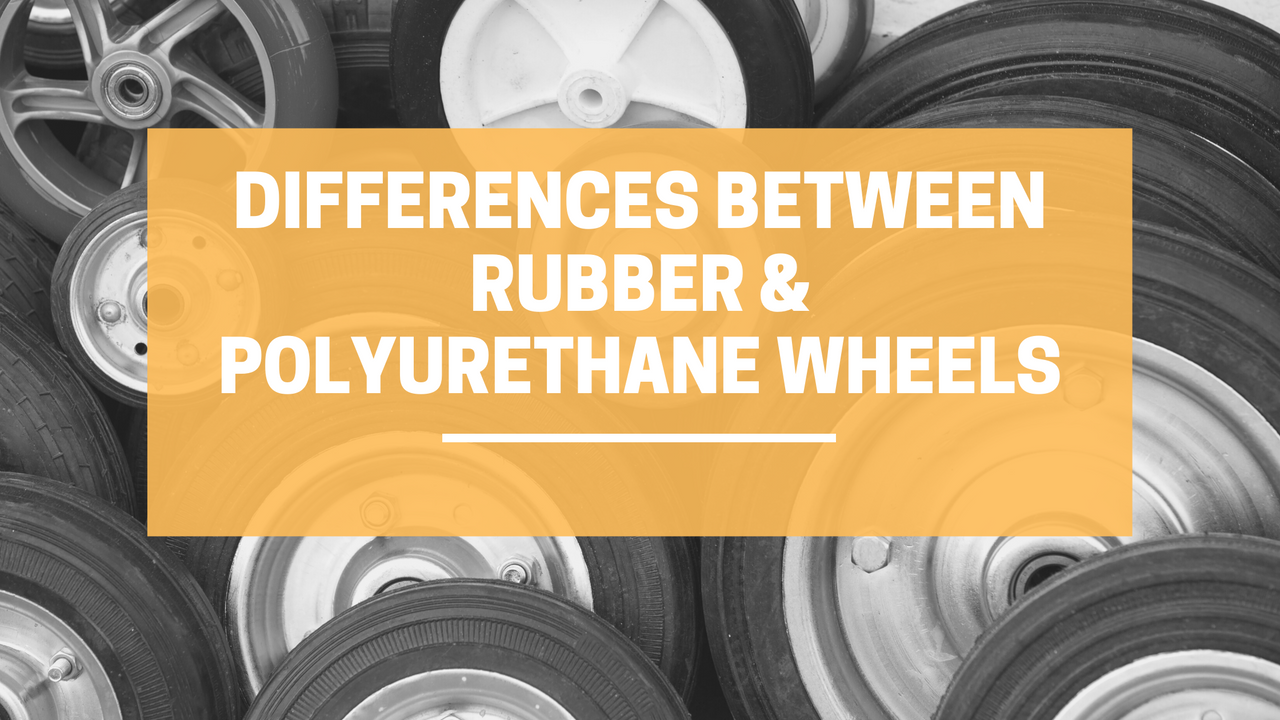Differences Between Rubber & Polyurethane Wheels
Regardless if you’re a manufacturing or industrial customer, moving heavy and bulky equipment from one location to another can become a burden. Without the right tools, this task will seem impossible to accomplish and might even cause injuries and accidents. Fortunately, the probability of these occurrences from happening will decrease when using caster wheels.
Caster wheels are rotating mounts often used in warehouses, manufacturing plants, and other places where there is large and heavy equipment that needs mobility. These wheels are essential in industrial and manufacturing settings and ensure the safety of the person moving the equipment.
Wheels come in many different materials today, but rubber and polyurethane are two of the most common. This article will discuss how these types of wheels differ from each other, why people use them, and what they use these wheels for.
Maximum Weight or Load Capacity
Using wheels will make it easier for you to carry heavy equipment, but keep in mind that these also have limited capacity. Moving equipment that exceeds the maximum load capacity of the wheels can cause damage to your flooring, cause inconvenience, and damage the wheels.
Between rubber and polyurethane wheels, the latter is known to carry heavier weights due to the hardness of its materials. Unlike rubber wheels, polyurethane wheels also have very thin treads that increase their load capacity. Polyurethane wheels are also more resistant to tearing and splitting than rubber wheels.
Floor Conditions
The wheels you choose to use can affect your floor conditions, which is why you should be careful when choosing. Using the wrong type of wheels for your current floor conditions can cause damage, stress, and a lot of expenses.
Since soft rubber casters are made using carbon black fillers, using these wheels on white-colored floors might not be ideal, as this material can leave marks. Hard rubber casters, on the other hand, are usually grey in color but are made with materials that don’t create or leave any marks on the floor. But regardless of the kind of rubber you choose for your wheels, keep in mind that the wheel tread of this material will eventually get hard and can cause scratches and dents on floors.
Generally, you should never use rubber wheels on soft flooring surfaces like terrazzo, wood, or linoleum. Over time, the contact of hard flooring and hardness of the wheel tread can cause friction, causing streaks and dents on the floor.
If you don’t want your flooring to be damaged in any way, using polyurethane wheels is more ideal. Polyurethane wheels come in different colors, but all of them are made from materials that prohibit color transference. This means that regardless of how often you use polyurethane wheels, the color will not transfer to the floor or cause damage.
Roll Resistance
The roll resistance of the wheels affects their ease of use. It’ll be easier for you to maneuver the wheels and move different kinds of equipment if the wheels have lower roll resistance. Using wheels that have low roll resistance will require less effort for you to move equipment around.
Since wheels made with polyurethane rubber are more uniform than wheels made from natural fiber, the former creates consistent levels of rolling friction whenever used, resulting in lower roll resistance. Polyurethane wheels are made from compounds harder than rubber, which is why they’re easier to maneuver than rubber wheels.
Wear and Tear
Buying wheels will cost you money, and buying one with a short lifespan isn’t a good investment. This is especially true if you’re going to use these wheels for your business.
Rubber and polyurethane wheels are useful, but rubber has a shorter lifespan because it loses pieces of its tread over time. Rubber wheels aren’t resistant to abrasion, causing them to wear faster.
Polyurethane wheels, on the other hand, have high levels of resistance against abrasion and tear. Polyurethane wheels are also resistant to chemicals, grease, and oils. In fact, countless tests have been performed to showcase how polyurethane wheels last three times longer than rubber wheels.
Knowledge Is Power
Rubber and polyurethane wheels are beneficial, but each has specific purposes. When deciding what type of wheels to buy, it’s vital that you have information about the materials and where these should be used. This information will ensure that you end up buying wheels that suit your needs and not waste any money during the process.
For all of your caster and industrial supply needs, purchase items from reliable sources like LINCO to get the best bang for your buck!

